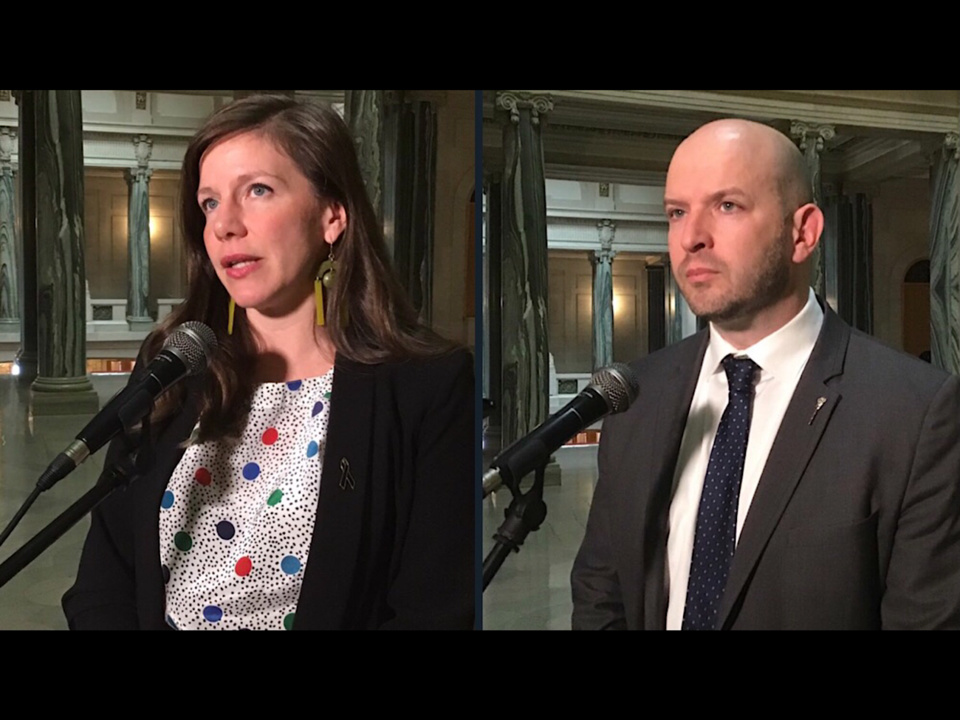REGINA - The opposition New Democrats wasted no time in calling for changes in the wake of the provincial auditor’s 2023 report Tuesday.
The party issued two news releases in response to Provincial Auditor Tara Clemett’s findings, both of which took aim at the Sask Party government. One release, on the recommendations regarding the Saskatchewan Income Support program, was titled “Sask. Party continues to fail our most vulnerable.”
The other release, on the findings regarding Indigenous students in the school system and at Saskatchewan Polytechnic, was titled “Under the Sask. Party, Indigenous students are falling behind.”
In that release, they characterized the auditor's report as having “condemned Scott Moe’s Sask. Party government for failing Indigenous students.”
In speaking to �鶹��ýAV.ca, NDP Education Critic Matt Love pointed to the Provincial Auditor findings that the Ministry of Education lacks specific targets for Indigenous student success, including grade-level performance in reading, writing and math. Love noted the high-school graduation rate for Indigenous students was 44.7 per cent and had not increased since 2018, according to the report. By contrast, the report pointed to the graduation rate for non-Indigenous students at 88.7 per cent.
Love said he supported the recommendations in the report, such as the auditor's recommendations calling for measuring numeracy, literacy, attendance and engagement well before grade 10.
“The provincial auditor’s provided some recommendations on how to move forward, including some measurable goals that start well before graduation,” said Love. He said those made “a lot of sense”, but wanted to see the government put these into action.
“Goals are very important, and absolutely support that auditor recommendation, but they need to come with resources so that school divisions can actually meet those goals."
Love pointed to the frustrations being felt in school divisions about a lack of funding support in general from the provincial government.
“I know as a teacher, I know how hard teachers and parents and school leadership is working to give every student an opportunity to succeed, but they feel like the government is working against them,” said Love.
Love also said that it should not have taken an auditor’s report for the issue to get on Education Minister Dustin Duncan’s radar.
“A really remarkable discrepancy between the graduation rate for Indigenous versus non-Indigenous students — this is something that Minister Duncan should have known. He should have already known this information already. He should have a plan already. He should be working on this diligently. He shouldn’t be waiting for the auditor to find this and to find the lack of a plan. I think it just shows misplaced priorities from this minister and from the SaskParty government.”
As for the provincial auditor’s findings on the Saskatchewan Income Support program, none of them came as a surprise to the NDP’s Social Services Critic Meara Conway.
“We’ve been hearing from folks and kind of witnessing firsthand, but it’s not an accessible program, it’s not doing enough to support people in all kinds of ways," said Conway.
She also said the finding that 5,200 SIS clients have unpaid SaskEnergy and SaskPower bills, amounting to almost $4.2 million as of Feb. 2023, did not shock her either. She said the issues with utility bills were “driving a lot of evictions.”
Conway also pointed to the finding in the report that 64 per cent of calls to the SIS program were going unanswered. She noted this was the experience people in her own riding was having, and also saw it as part of a wider problem of administrative issues with the SIS program.
“People are constantly calling our office, they’re not getting what they think they’re entitled to, they’re getting mistakenly kicked off the benefits, the benefits aren’t coming on time,” said Conway.
Conway condemned the current state of the SIS program in speaking to �鶹��ýAV.ca.
“It’s a terrible program, and behind these numbers is a lot of suffering, a lot of chaos,” said Conway. “There’s a lot of survival activities, which, if you want people to become self-sufficient, you don’t want to put them in situations where they’re struggling like hell to survive each and every day.”
As for what to do with the SIS, Conway said she wanted “wholesale changes.”
“It’s not a functioning program. They need to scrap SIS and get back to the table with stakeholders and find a new way to support people.”



